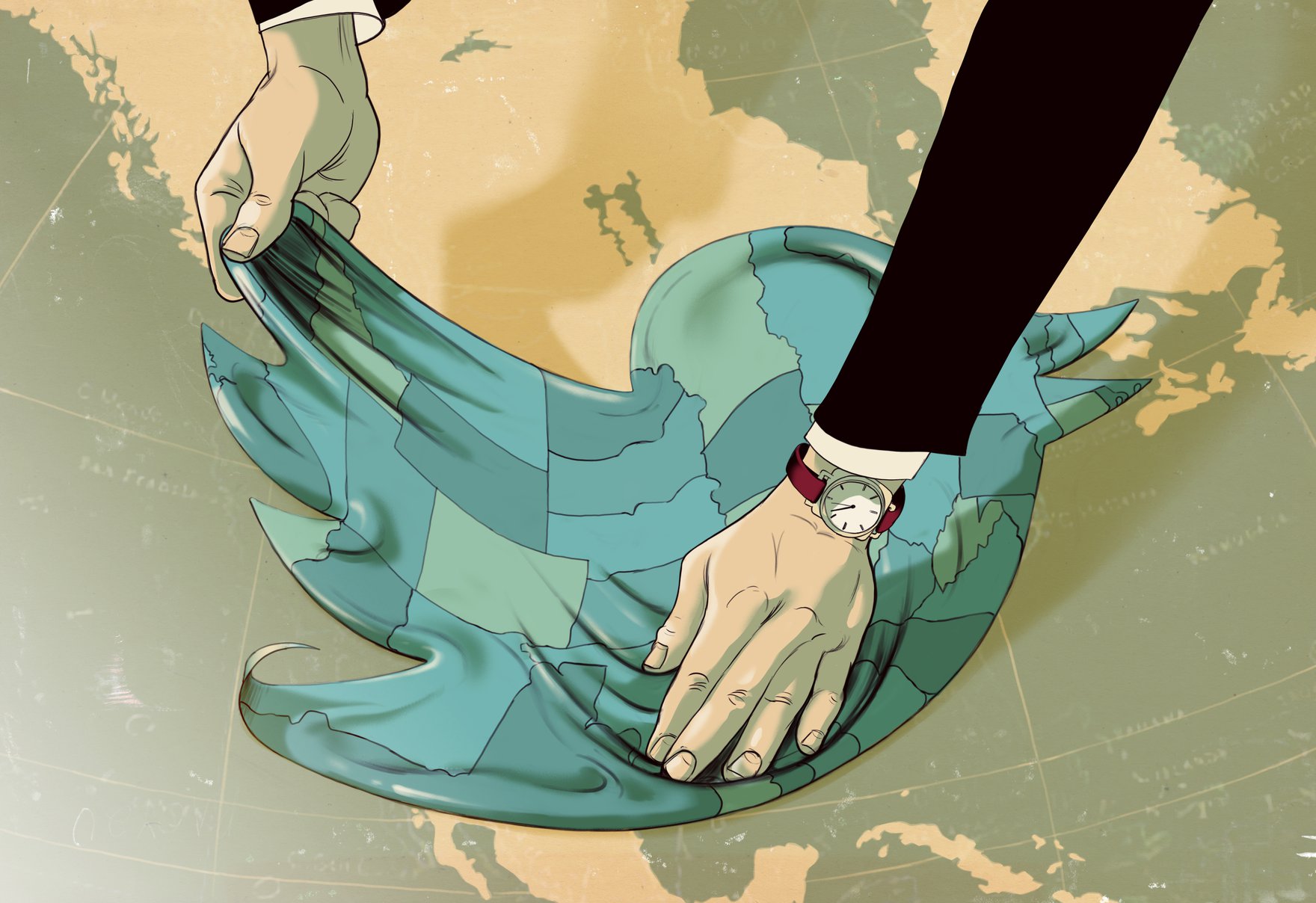President Trump has left the building. In his final days, in one of the most symbolic moments of his short period in the White House, after his supporters had haphazardly stormed the Capitol Building on January 6, the inveterate (ab)user of social media was banned from, first, Facebook and then his favourite platform, Twitter. For the farthest right in North America, digital platforms’ decision to ban Trump represented the fulfilment of fears of “socialist” censorship; everyone else saw the enormous drop in the spread of misinformation and hate speech across the entire social media ecology. But this moment was more than simply symbolic. Donald Trump, although by this stage the lamest of lame duck presidents, was still the president of the most powerful state in the world, and yet system administrators working for platform corporations could cut off his main lines of communication to his supporters — and, indeed, to the American people more broadly. Even though he was using his personal account, @realdonaldtrump, not the formal @POTUS, Trump’s tweets had already long been established as official statements; he had engaged with foreign leaders and had fired officials by tweet. And now Twitter had fired him.
Just as contemporary activist movements rely on platforms, so too does authoritarian populism. Platforms have played such a significant role in the success of this current wave of global authoritarianism that one might even call it platform authoritarianism. Where Trump had Twitter, President Jair Bolsonaro in Brazil had WhatsApp; more specifically, Bolsonaro rose to power through a regressive movement that lived not just in the streets but was organized and composed on countless WhatsApp groups — a contemporary, more networked version of the classic revolutionary cell structure, perhaps. The attempted genocide of the Rohingya people by the military in Myanmar was also partly organized and encouraged on Facebook. And, more mundanely, platforms are used routinely by specialist data analysis groups — whether they are private companies such as the infamous Cambridge Analytica, or state-sponsored, like the “Bear” groups linked to Russian security intelligence — to attack, undermine and even hijack democratic systems, from national elections to referenda, using enormous quantities of intimate user data for targeted political advertising, misinformation and voter suppression.
Just as contemporary activist movements rely on platforms, so too does authoritarian populism.
Nowhere was Trump’s demise celebrated more than on TikTok, the youth-oriented video-sharing social media app, which Trump himself had targeted during his final year in office. What is different about TikTok is that it isn’t the product of a Silicon Valley platform corporation; instead, it’s from a Chinese company, ByteDance. An ever-present feature of the Trump presidency was the baiting of China and Chinese companies, but his feud with TikTok came to a head in his term’s final year, almost provoking, first, a ban on the app on supposed national security grounds, and then, the forced sale of the app to an American buyer. No one is going to accuse the former president of having a coherent ideological or political agenda around TikTok. His objections were instinctive and something of a macho faceoff for public viewing; they were not about national security, nor were they formed by any resistance to the authoritarianism of China, as his friendship with Bolsonaro, Vladimir Putin, Rodrigo Duterte and many other authoritarian figures shows.
However, as with the complaints about YouTube, Facebook, WhatsApp and Twitter, the concerns about TikTok are reflective of a deeper dilemma that the governments of nation-states around the world will have to confront increasingly in the coming years. Beyond the question of privacy and personal data harvesting, there is something much bigger to ask regarding the accelerating power of platforms. In short, it is this: Does the rise in the power of platform corporations presage a new era in which not only the economy but also government itself is transformed, to the extent that the platform may represent, perhaps, a new model for both capitalism and the nation-state?
Infrastructures, Nation-States and Capitalism
Given that contemporary platforms have equally, by turns, enchanted, annoyed and disgusted nearly everyone at some time or another, it would be easy to conclude that they have no particular politics, or that their only politics is a species of data-driven neo-liberal capitalism, or “surveillance capitalism,” as Shoshana Zuboff has termed it. That would be a mistake. I am certainly not arguing that surveillance capitalism is not real; on the contrary, whether one defines it as Zuboff does or uses an earlier or more expansive definition, surveillance capitalism is an important part of the global restructuring of the political-economic system that we are now seeing, a struggle for the reconfiguration of the relationship between nation-states and the technological infrastructures that support industry, government and social life. Google’s parent company, Alphabet, is finding ways to collaborate with governments to advance its own corporate interests. Google is already the de facto default search engine of choice for everybody, but that’s just the beginning. Google and Alphabet are leading players in artificial intelligence (AI), in augmented reality (AR), in remote sensing and mapping, and perhaps in quantum computing as well; they are going into infrastructure, broadband and undersea cabling; they are starting to create plans for ideal communities “from the Internet up,” as we saw with the failed Sidewalk Toronto scheme, and much more. In short, they are creating a complete system.
McKenzie Wark, a professor of media and cultural studies at The New School in New York, has been asking for some time whether one can really call this capitalism any more, since information has already changed the rules, creating new emerging classes and something that Jodi Dean has described more as a kind of neo-feudalism, with exploitations benefiting only a tiny number of hyper-rich, centibillionaires, who own the same proportion of the world’s wealth as the bottom 50 percent. One of the most insightful views of this change has come from Benjamin Bratton, who argues that this is not just a new economic system, but a new form of social, economic, political and ecological life based on planetary computing. Platform corporations in this revisioning are neither the joint-stock companies of capitalism at the dawn of the twentieth century, nor the fluid, financialized transnational entities of the dawn of the twenty-first century’s neo-liberal capitalism. Instead, they are primarily vehicles for the emergence of platforms as the next form of (trans-)human organization after city states, empires, nation-states and markets.
A world of neo-feudal platform governments (maybe with tame nation-states beneath them) is far from the only option for what is inevitably some kind of technologically driven future. It is equally easy to see, at least in the short term, the resurgence of neo-liberalism, as can be seen in a post-pandemic program such as the World Economic Forum’s “Great Reset,” in which the emphasis on global problems clearly sets out a trajectory toward some kind of global governance, by stealth or necessity. Indeed, it seems hard to imagine that capital would tolerate more than a short break from a global economy that has generated unparalleled profits. It would be a significant and very costly step backward to abandon the unfinished but already almost complete project of globalization. And, as the Great Reset program is already showing, the seriousness of “planetary” concerns such as climate change, pandemic prevention, migration and security are already being cited as justifications for a revitalization of projects for a neo-liberal form of global government, that is, global government without democracy.
Under Trump, the United States backed away from this “globalism.” The populist right have not gone away with Trump’s defeat, and the horror that they feel when confronted with the idea of global government could easily result in multiplying authoritarianisms. If one thinks of the authoritarian populist turn as a nostalgic reaction to globalization, then — as the enormous scale of contemporary problems (in particular, climate change, mass migration and platform capitalism) becomes clearer — we will see ever more reactionary responses to these. We have already seen manifestations of eco-fascism — profoundly pessimistic versions of environmental thinking combined with nationalism — and, in recent protests in France against the new surveillance and security bill, we saw not only progressive forces but also populists such as the gilets jaunes (“yellow vests”) and right-wing COVID-19 conspiracy groups.
This turn to the right could also open up the possibility of a global “neo-liberalism with Chinese characteristics.” One can examine the way in which TikTok was accused of being a front for Chinese security intelligence services — a mechanism for gaining personal information from users worldwide as a form of intelligence gathering activity — and one can observe that TikTok is far from exceptional, in two main ways. First of all, its links to the Chinese government are entirely normal in China: Chinese tech giants such as Huawei, Baidu and TenCent all have to have close ties to the Chinese Communist Party. This alignment is partly because they share a genuine agreement in terms of the strategic aims of the leaders of those companies and the Chinese state, but also because of necessity. That’s the way things work in China, but it’s not because the Chinese government directly controls all those companies. So long as the Chinese state continues to be successful in using technology in order to advance its particular interests, companies will be totally on board with them.
A world of neo-feudal platform governments (maybe with tame nation-states beneath them) is far from the only option for what is inevitably some kind of technologically driven future.
Secondly, TikTok is also unexceptional, because just about every piece of internet software, every social media site and every app, from every country, collects types and quantities of persona data that are completely unnecessary for the actual operation of the app, software or site. In most cases, the data is collated, analyzed, packaged into “prediction products” and sold — the Google model of surveillance capitalism, as outlined by Zuboff. Some data is used internally for marketing and product development. And much is undoubtedly shared, voluntarily or involuntarily, with national security intelligence services, particularly with those in the United States, just as data is shared in China. While some companies such as Apple make a show of resisting the US state, we know that most Silicon Valley platform corporations were persuaded to cooperate with the US National Security Agency’s PRISM program, one of many surveillance programs revealed by Edward Snowden in 2013; this came as no surprise to those familiar with previous revelations about software and hardware companies and “back doors” in the 1990s. Most American social media companies are required to turn over data to the state; the question is whether we believe this activity is significantly worse for it being carried out by a Chinese company than and American corporation and if so, whether it warrants action against Chinese social media apps.
China has emerged as the United States’ main competitor across a number of technological fields, in everything from drones and autonomous vehicles, through sensors, smart city and surveillance tech, all the way to quantum computing and artificial intelligence. This competition between the two nations has led to multiple accusations of industrial espionage in both directions. What is happening in this very short-medium term is a technological politics that is associated very strongly with geopolitical competition, and the depiction of a world in which China and the United States are vying to lead the world in both technological and geographical terms. But China’s “offer” is in many ways more coherent, more predictable and more integrated — and to nations in which democracy isn’t a strong concern (which includes most of the Central Asia nations that China’s Belt and Road infrastructure is projected to run through), it would seem more attractive than the multiple, fragmented, unreliable and private-profit-oriented offers from Silicon Valley. And it is not just the Belt and Road nation-states of Central Asia that are still betting this way; less powerful nation-states, in Africa, in particular, have been leaning toward China for years.
However, China’s repression of the Uighur Muslim population in Xinjiang has done some damage to this program; in addition, China has other regional competitors. For example, India — a major player in the global tech sector and operating under Prime Minister Narendra Modi’s strongly authoritarian and nationalist government — is constantly looking for good excuses to ban Chinese platforms and Chinese software from the Indian technological space. Indeed, in June 2020, India did what the United States had only threatened to do and banned 59 apps, including TikTok, almost all of them Chinese, claiming that they were threats to India’s sovereignty and integrity.
In their own ways, China and the European Union both offer different variations on the question of global techno-political order: the former is an old-fashioned empire, complete with its own cutting-edge infrastructural and platform technology; the latter offers a modest social democratic, bureaucratic, transnational government, with regulations in place to protect people both from platforms and the right, although these in practice have only moderate success. The EU bloc has been rocked by the departure of the United Kingdom, by its failure to deal humanely with the challenge of a refugee crisis, and by the return of authoritarianism in Eastern and southern Europe, particularly in Hungary and Poland, but also in Italy and Greece. However, its approach remains a major alternative model to neo-liberalism, to China’s empire and to the platforms. It has been argued that that the European Union is suffering from a kind of technological or innovation lag, and because it cannot produce successful platform corporations of its own, it is trying to take down America’s. But this notion ignores its consistent political pattern of modestly favouring social goals over techno-economic ones. The European Union is not radical, and as a whole it is not even socially democratic, apart from the Scandinavian countries. However, it has always sought to compensate for the worst effects of capitalism and is not afraid to impose rules on the market. The General Data Protection Regulation (GDPR) is the embodiment of this approach: it is at once the most advanced law on the planet attempting to govern a whole range of questions around information, data, technology and their relationships to people, state and corporations, yet also a massive and unwieldy colossus that still remains behind the times, constrained by its compromises and mired in its origins. Nonetheless, the European Union has significant international influence in this area, largely because the United States has long abdicated any duty to regulate platform corporations or to transform the approaches of other nations by proxy; if you want to trade with, or in, the European Union, your national data protection regime must be deemed adequate’ under the terms of the GDPR. As a result, some nations have massively upgraded their laws on privacy and data protection, Japan being a notable example.
Regulating Platforms Is Not Enough
The world could follow the European Union’s lead and try to regulate platforms from the data protection and privacy perspective. The world could also follow the calls from some in the United States to utilize antitrust law to limit or even break up platform corporations. Another possible action, advocated by some progressive thinkers like Nick Srnicek, would be to nationalize platform corporations. But these all appear to be solutions from the past. Nationalization would seem to feed more into a kind of post-Brexit populism rather than into a progressive politics approach that understands the world as already interconnected, and that platforms are part of that interconnection. Breaking up platforms would involve many of the same problems attached to understanding platforms as purely an artifact of the economy, although it would depend on how the breaking up was done; the EU solution, regulating data protection and privacy, does not deal with the fundamental question of political-economy power at all.
I mentioned earlier that whatever the future is, it will be, in some way, technologically driven, but this is only true from a certain point of view — there is another possible future, and that is no future at all. Hovering over the entire question is the spectre of both ecosystem and civilizational collapse, caused by the very rapacity of the capitalist system I have been discussing. Platform capitalism has, so far, offered very little toward the solution of global climate breakdown. Blockchain champions spread the myth of virtuality, of impact-free wealth creation, and offload their substantial environmental and social costs to vague and distant places and times, their advocates arguing that someday this will all run on renewable energy, but for now, we have to restart mothballed coal plants in Mongolia to power Bitcoin mining, or whatever bogus wealth-creation scheme comes next. Even cooling for cloud computing servers is a massive energy drain. Microsoft has experimented with sinking servers in waterproof heat-exchange modules deep in the sea. Other platform corporations have been relocating server farms from California to Iceland, or even further north, moves of dubious logic given that the Arctic is warming more rapidly than the rest of the planet. Despite their claims to ‘innovation’, the platforms seem to be simply shuffling problems around or making new ones, not solving them.
The spectre of planetary climate breakdown and the emergence of computing infrastructure at the planetary scale, are, it seems, headed for an inevitable collision, a reckoning that will shape the future of the planet as much as the politics of technologies. One of the biggest issues for those of us who have spent so much time fighting against surveillance and for privacy and human rights is that the longer our current governments fail to deal with climate breakdown — and both the Netherlands and France have now lost court cases brought by citizens angry about exactly this foot-dragging — the more likely it is that the solutions become, at once, more authoritarian and more surveillant.
Platform corporations know us and they know about us; putting our personal data to work, along with all of the data about the planet, collected through everything from satellite observation of ice sheets through to ocean temperature sampling to animal tags, is going to seem like a logical way, maybe the only way, to deal with climate breakdown. I argue that we are going to see not less surveillance, but more widespread and intensified surveillance, but this time it will be framed as something that is for our own good, for the good of humanity. In his 2017 Open Letter to the Facebook Community, Mark Zuckerberg argued that Facebook could do things better than governments. And other platform corporate thinkers have gone much further. Peter Schwartz of Salesforce, for example, claims that the planetary emergencies will drive us to accept total surveillance, out of a feeling of necessity. “Gradually, we will accept much, much greater surveillance,” Schwartz said in an interview in 2020, “and in the end we won’t be too bothered by it.”
The danger is that this narrative, combined with the visions of space explorations presented by Jeff Bezos and Elon Musk, can seem quite attractive when put up against proliferating petty, populist authoritarianisms, faceless neo-liberalism, and maybe even against the fussy regulationism of the European Union.
I argue that we are going to see not less surveillance, but more widespread and intensified surveillance, but this time it will be framed as something that is for our own good, for the good of humanity.
We need vision but, as always, what has been squeezed out of the conversation is anything genuinely radical or progressive. The industrial workers of the world did not quite unite enough, nor have platform workers, at least not yet, although there are positive signs around unionization within Alphabet and Amazon. The neo-liberal fragmentation of the labour force into precarious, entrepreneurial individuals fighting for scraps has only been accelerated by almost every platform corporation through their business models and their political lobbying, and by the authoritarian populists, who are far more afraid of unions and labour rights solidarity than of the destruction of the “traditional” communities and ways of life they claim to represent.
If we understand platforms as, simultaneously, an economic, political and social phenomenon — in other words, as emerging alternatives to nation-states — we will be able to confront them better. The platform cooperative movement is starting to develop one set of alternatives, both imagining how existing platforms could be cooperatively owned and managed, and creating new platform cooperatives. Where could this go? The Japanese philosopher Hiroki Azuma has argued that the internet could, if allowed to, function as a technological instantiation of what Rousseau called “the general will,” enabling a true planetary democracy through the collation of everyone’s views and feelings. Flawed nation-state-based democracy has never been able to do this. Recently, novelist Malka Older, in her science fiction series The Centenal Cycle (beginning with Infomocracy), has developed a version of how something like this might work: though a combination of a pervasive planetary information net (imagine if Google and the United Nations merged into one entity) and proliferating micro-democracies at a local level.
We could, one way or another, take the platforms. Breaking them up or nationalization could be routes to this, but only if those moves were seen as part of a process, not as an end solution. The platform could continue to be just another differently shaped vessel for the enrichment of the very few, or it could be a way of finally slicing through what philosopher and literary critic Kojin Karatani has called the “Borromean knot” (a tightly interlocking 3-way bond) of nation, state and capital — and moving away from exploitation, environmental destruction and pervasive surveillance toward an entirely new form of more genuinely democratic government.





